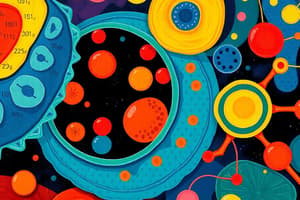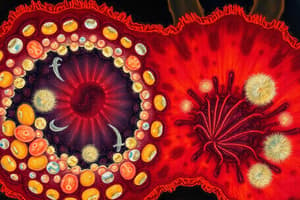Podcast
Questions and Answers
What is the primary function of a cell membrane?
What is the primary function of a cell membrane?
- To control the movement of substances in and out of the cell. (correct)
- To provide energy for cell processes.
- To facilitate cell division.
- To store genetic information.
Which of the following components is essential for protein synthesis?
Which of the following components is essential for protein synthesis?
- Lysosomes
- Mitochondria
- Vesicles
- Ribosomes (correct)
What role do enzymes play in biochemical reactions?
What role do enzymes play in biochemical reactions?
- They provide structural support to cells.
- They slow down the reaction rates.
- They act as catalysts to increase reaction rates. (correct)
- They are consumed during the reactions.
Which of the following is NOT a function of the cytoskeleton?
Which of the following is NOT a function of the cytoskeleton?
What is one function of the mitochondria?
What is one function of the mitochondria?
Flashcards
Cell Membrane Function
Cell Membrane Function
Controls what enters and exits the cell.
Ribosomes
Ribosomes
Organelles responsible for creating proteins.
Enzymes Role
Enzymes Role
Speed up biochemical reactions.
Cytoskeleton Function
Cytoskeleton Function
Signup and view all the flashcards
Mitochondria Function
Mitochondria Function
Signup and view all the flashcards
Study Notes
Cell Membrane Function
- Regulates the passage of substances in and out of the cell, acting as a selective barrier.
Protein Synthesis
- Ribosomes are essential for protein synthesis. They are responsible for translating genetic information carried by messenger RNA (mRNA) into proteins.
Enzyme Function
- Enzymes act as biological catalysts, accelerating biochemical reactions by lowering activation energy.
Cytoskeleton Functions
- The cytoskeleton is responsible for providing structural support, maintaining cell shape, and facilitating cell movement. It is NOT involved in protein synthesis.
Mitochondria Function
- Mitochondria are responsible for generating energy in the form of ATP (adenosine triphosphate) through cellular respiration. This process utilizes glucose and oxygen to produce energy.
Studying That Suits You
Use AI to generate personalized quizzes and flashcards to suit your learning preferences.





